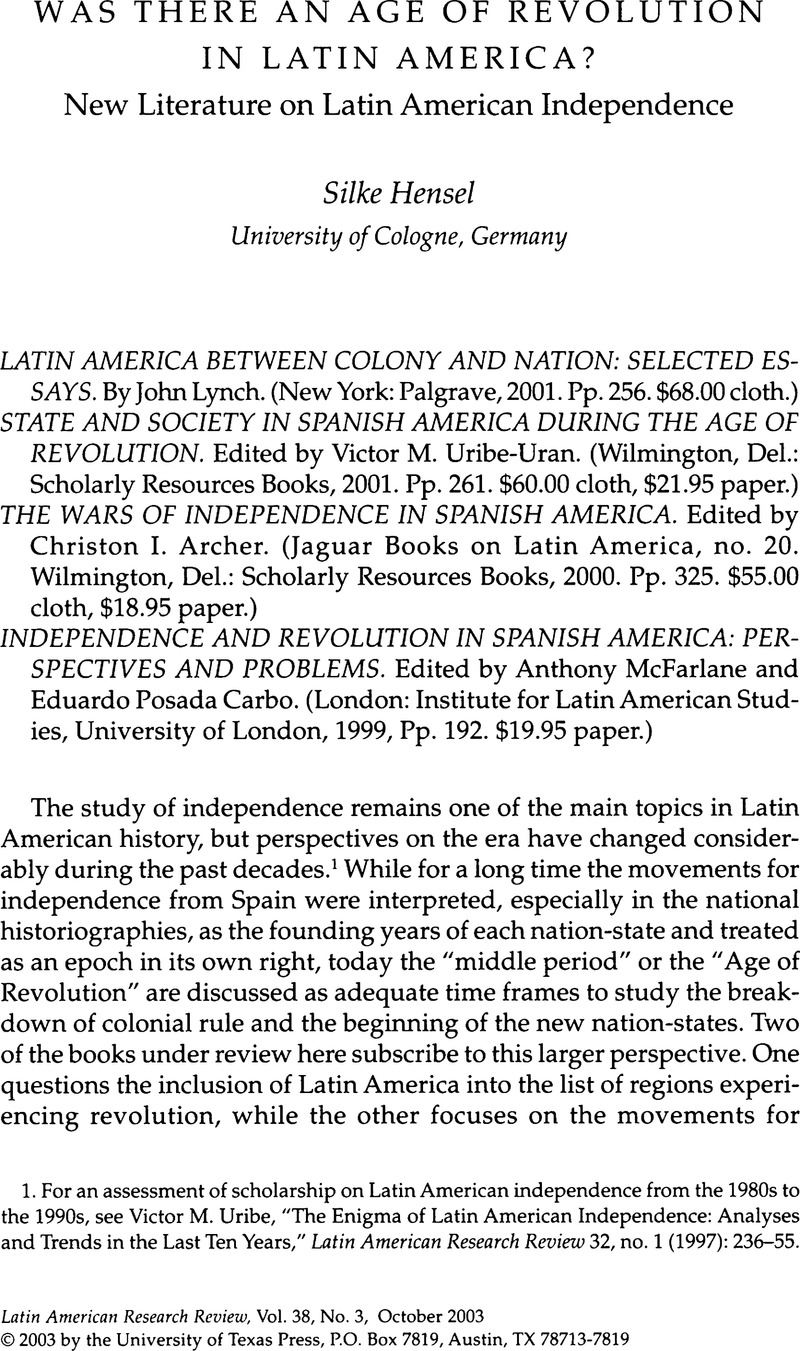Article contents
Was There an Age of Revolution in Latin America?: New Literature on Latin American Independence
Review products
Published online by Cambridge University Press: 05 October 2022
Abstract

- Type
- Review Essays
- Information
- Copyright
- Copyright © 2003 by the University of Texas Press
References
1. For an assessment of scholarship on Latin American independence from the 1980s to the 1990s, see Victor M. Uribe, “The Enigma of Latin American Independence: Analyses and Trends in the Last Ten Years,” Latin American Research Review 32, no. 1 (1997): 236–55.
2. John Lynch, Latin American Revolutions, 1808–1826: Old and New World Origins (Norman: University of Oklahoma Press, 1965). A second version was published in 1994.
3. Two of the most influential historical works on the concepts of invention and social construction are Eric Hobsbawm and Terence Ranger, eds., The Invention of Tradition (Cambridge: Cambridge University Press, 1983); and Benedict Anderson, Imagined Communities: Reflections on the Origin and Spread of Nationalism (London: Verso, 1983).
4. See Josefina Zoraida Vázquez, “El federalismo mexicano, 1823–1847,” in Federalismos latinoamericanos: México/Brasil/Argentina, ed. Marcello Carmagnani (Mexico City: Fondo de Cultura Económica, 1993) 15–50.
5. John Coatsworth, Los orígenes del atraso: nueve ensayos de historia económica de México en los siglos XVIII–XIX (México: Alianza Editorial Mexicana, 1990); Stephen Haber, ed., How Latin America Fell Behind: Essays on the Economic Histories of Brazil and Mexico, 1840–1930 (Stanford: Stanford University Press, 1997).
6. Jaime E. Rodríguez O., Down From Colonialism: Mexico's Nineteenth Century Crisis (Los Angeles: Chicano Studies Research Center Publications, University of California, 1983).
7. Susan Chambers, From Subjects to Citizens: Honor, Gender, and Politics in Arequipa, Peru, 1780–1854. (University Park: Pennsylvania University Press, 1999).
8. Jaime E. Rodríguez critized this exclusion in his contribution to the volume Mexico in the Age of Democratic Revolutions, 1750–1850, ed. Jaime E. Rodríguez O. (Boulder: Lynne Rienner, 1994).
9. Jaime E. Rodríguez O., La independencia de la América española (México: Fondo de Cultura Económica, 1996).
10. See François-Xavier Guerra, ed., Las revoluciones hispánicas: independencias americanas y liberalismo español (Madrid: Editorial Complutense, 1995); François-Xavier Guerra and Monica Quijada, eds., Imaginar la nación (Münster/Hamburg: Lit-Verlag, 1994).
11. François-Xavier Guerra, “El olvidado siglo XIX,” Balance de la historiografía sobre Iberoamérica (1945–1988). (Pamplona, Spain: EUNSA, 1989), 593–631.
12. See Antonio Annino, ed., Historia de las elecciones en Iberoamérica, siglo XIX: de la formación del espacio político nacional (Buenos Aires: Fondo de Cultura Económica, 1995); José Carlos Murilo de Carvalho, Desenvolvimiento de la ciudadanía en Brasil (México: Fondo de Cultura Económica, 1995); José Carlos Chiaramonte, Ciudades, provincias, estados: orígenes de la nación argentina (1800–1846) (Buenos Aires, 1997); François-Xavier Guerra, Modernidad y independencias (Madrid: Mapfre, 1992); Marta Irurozqui Victoriano, “A bala, piedra y palo”: La construcción de la ciudadanía política en Bolivia, 1826–1952 (Sevilla, Spain: Diputación de Sevilla, 2000); Eduardo Posada Carbó, ed., Elections Before Democracy: The History of Elections in Europe and Latin America (London: Macmillan, 1996); Hilda Sabato, “Citizenship, Political Participation and the Formation of the Public Sphere in Buenos Aires, 1850s-1880s,” in Past and Present 136 (1992) and Ciudadanía política y formación de las naciones: Perspectivas históricas de América Latina (México: Siglo XXI, 1999); Mark Thurner, From Two Republics to One Divided: Contradictions of Postcolonial Nationmaking in Andean Peru (Durham/London: Duke University Press, 1997).
13. Sandra Gayol, Sociabilidad en Buenos Aires: Hombres, honor y cafés, 1862–1910 (Buenos Aires: Ediciones del Signo, 2000); Hilda Sabato, La política en las calles: Entre el voto y la movilización, Buenos Aires 1862–1880 (Buenos Aires: Sudamericana, 1998).
- 2
- Cited by


